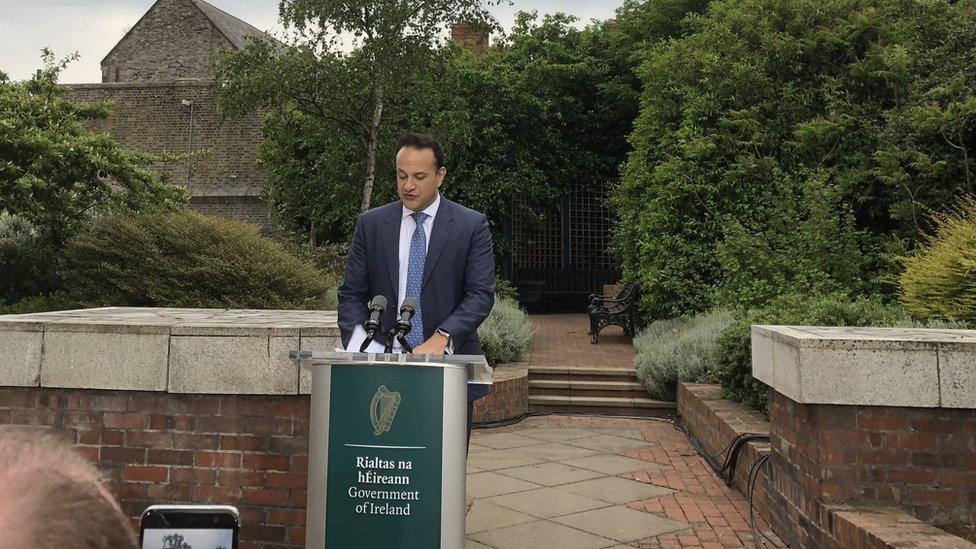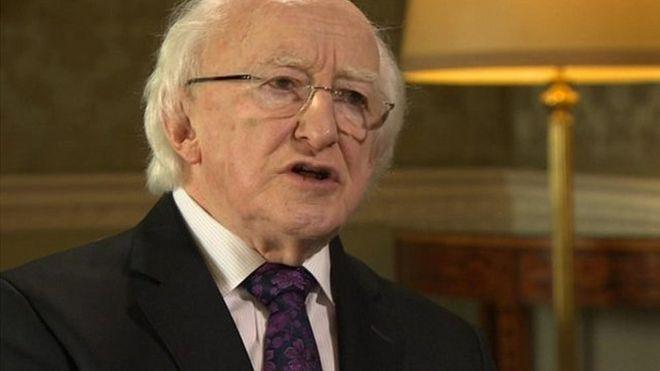Concerns as Irish abortion services start
- Published

The Republic of Ireland voted to overturn its abortion ban in a referendum in May
Seven months and nine days ago, 1.4 million people in Ireland voted to remove its anti-abortion laws.
What (Taoiseach) Irish PM Leo Varadkar called a "quiet revolution", had culminated with a day when the Eighth Amendment was repealed.
Irish Health Minister Simon Harris hailed the passing of the legislation as a "new era for Irish women".
This new era began on Tuesday, when abortion services in Ireland were opened for the first time.
But this new era is not without its challenges, as many Irish medical groups have warned.
When did abortion services start?
As of 1 January 2019, Irish abortion services are being provided by Ireland's health service through GPs, family planning services, maternity units and hospitals across the country.
What abortion services are being provided?
Since last year's referendum, the law in Ireland now allows for abortion in the following cases:
Up to 12 weeks of pregnancy
Where there is a risk to the life or of serious harm to the health of the pregnant person
Where there is a condition likely to lead to the death of the foetus before or shortly after birth
Abortion care is being provided free of charge for people normally living in Ireland.
Has anyone accessed these services since they began?
There are no official details on how many abortions have taken place since the introduction of the new services on Tuesday.

Repeal campaigners celebrate at Dublin Castle. where the result was announced
A spokesperson for Ireland's Health Service Executive (HSE) said that its new unplanned pregnancy support service My Options had received "a steady stream of calls" since opening at 09:00 local time on 1 January.
Can you access abortion services in all of Ireland's maternity units?
Not yet. Ireland has 19 maternity units, but only nine are currently providing abortion services. These are:
National Maternity Hospital in Dublin
Midland Regional Hospital in Westmeath
Rotunda Hospital in Dublin
Our Lady of Lourdes Hospital in Meath
University Hospital, Galway
Mayo University Hospital
University Maternity Hospital in Limerick
Cork University Maternity Hospital
University Hospital Waterford
It is expected that other hospitals will begin to provide abortion care in the near future. The HSE will provide information to women and to healthcare professionals about where and how services are available as they start providing the service.
How have GPs reacted?
Some medical groups in Ireland have voiced concerns over the January deadline.
Dr Maitiu O'Tuathail, president of the National Association of General Practitioners (NAGP), told BBC News NI about 3 to 5% of GPs had signed up to deliver abortion services.
"There remains a lot of uncertainty for GPs around the provision of abortion services in Ireland," he said. "GPs are being asked to operate without updated Medical Council guidelines, which is problematic.
"The access to ultrasonography is patchy across the country and will remain so for the foreseeable future.
"Finally, the services and medical back-up that maternity hospitals will be able to provide on a site-by-site basis remains unclear.

"We voted for the 200,000 women who travelled to England since 1983," said Leo Varadkar, referring to Irish women who had sought abortions in the UK
"It would have been preferable, if these uncertainties had been resolved prior to, and not during the roll out of abortion services.
"We should strive for the best and safest service possible, anything less simply isn't good enough."
A spokesperson for the HSE said it had agreed an approach with GPs whereby details of GPs taking part in providing abortion care will not be published. Details are provided directly to people who need them, through the executive's new My Options helpline.
"We are satisfied that there is already a good geographic spread of GPs taking part, enough to meet the needs of people who may need to access the service," said the spokesperson.
"Currently 179 GPs have signed the contract and each day more GPs are signing up."
Any other objections?
The Institute of Obstetricians and Gynaecologists is to hold an emergency general meeting on the implementation of the new abortion services, particularly on the safety and readiness of these services.
A date for this meeting is yet to be set.
In October, the masters of the three Dublin maternity hospitals wrote to Mr Harris expressing concerns about the suggested commencement date, which has now passed.
The masters of the Rotunda Hospital, Coombe Women and Infants University Hospital and the National Maternity Hospital said the date was "unrealistic" for the full range of abortion services.
Both the Rotunda and National Maternity Hospital are now listed as abortion service providers.
- Published18 September 2018

- Published26 May 2018

- Published26 May 2018
